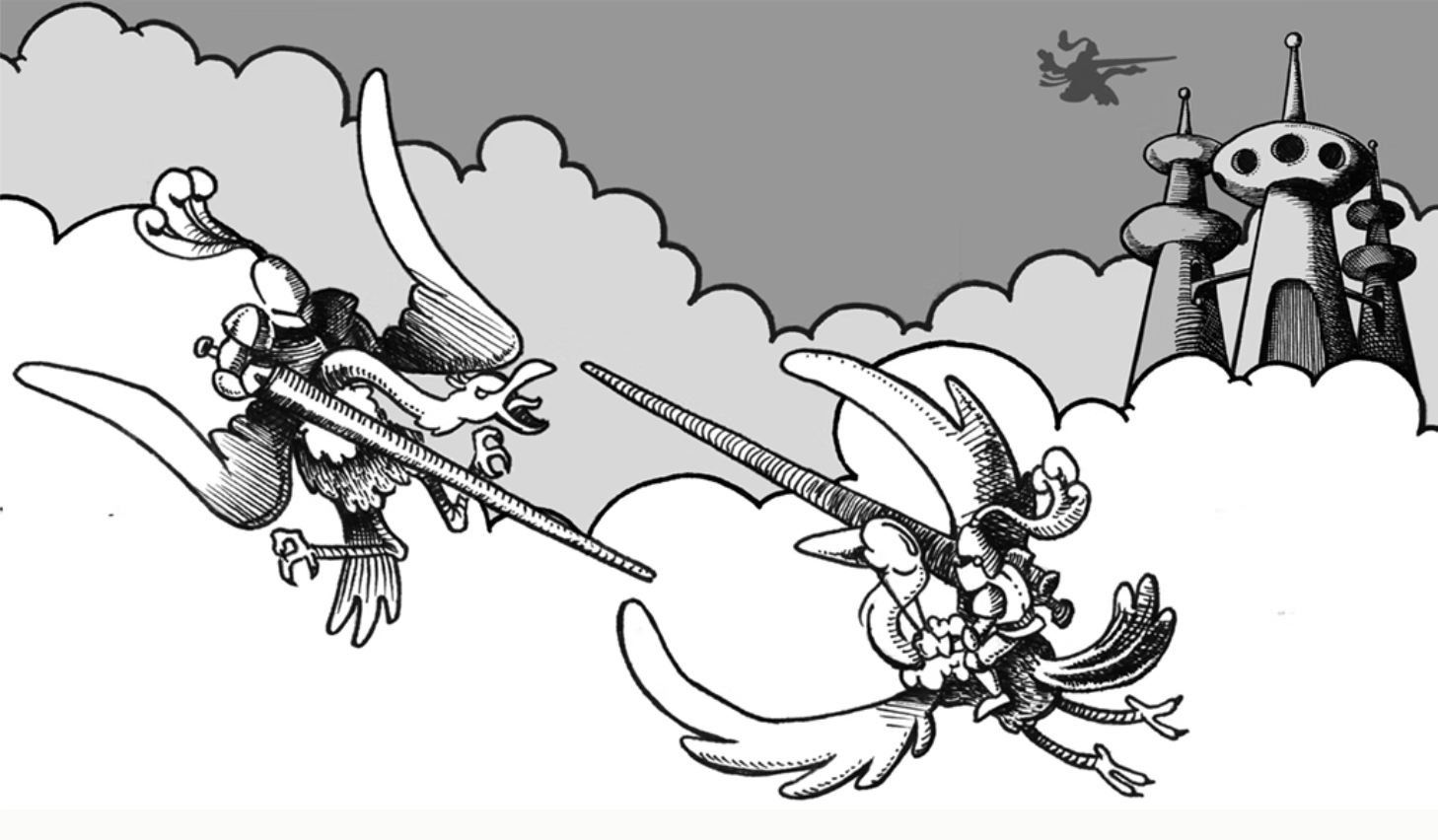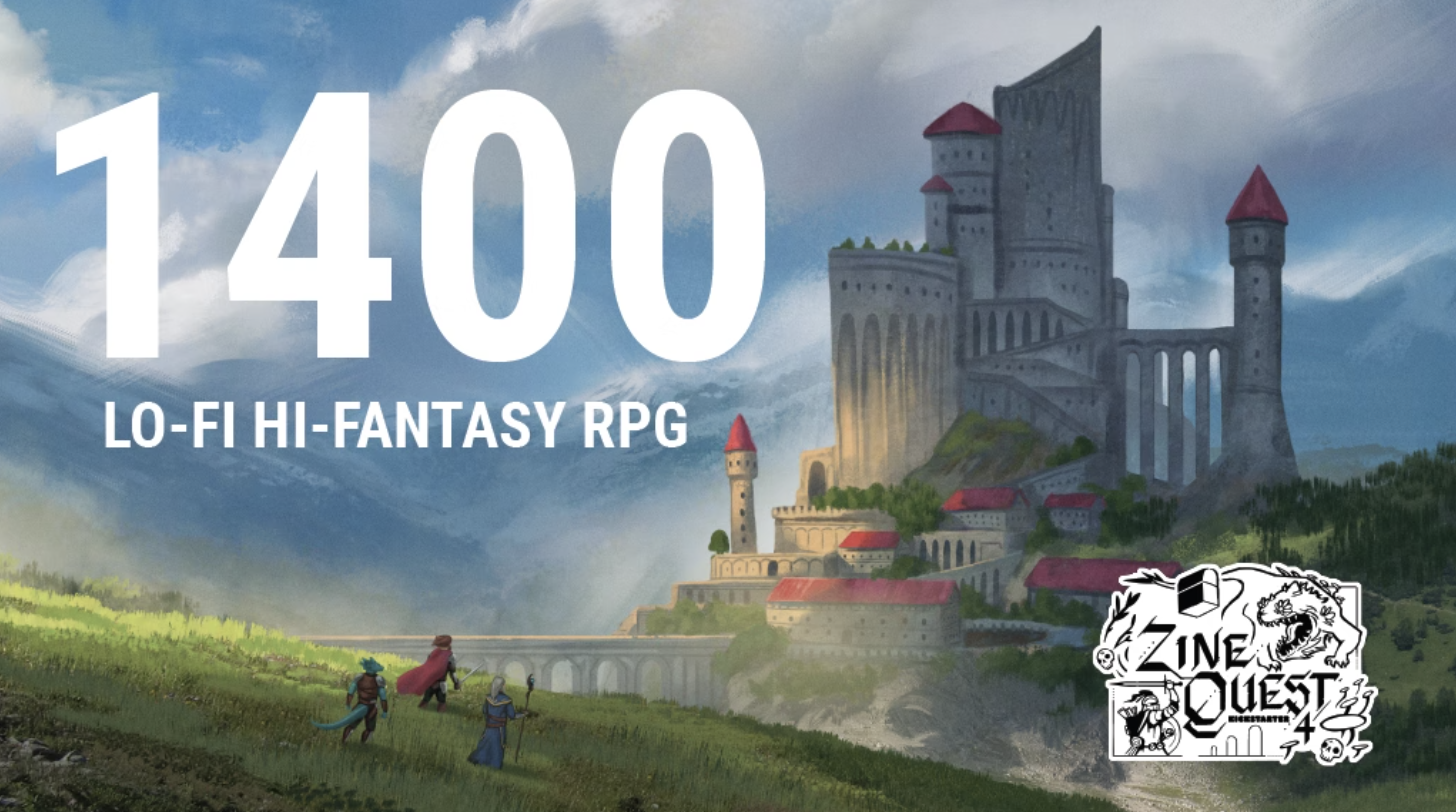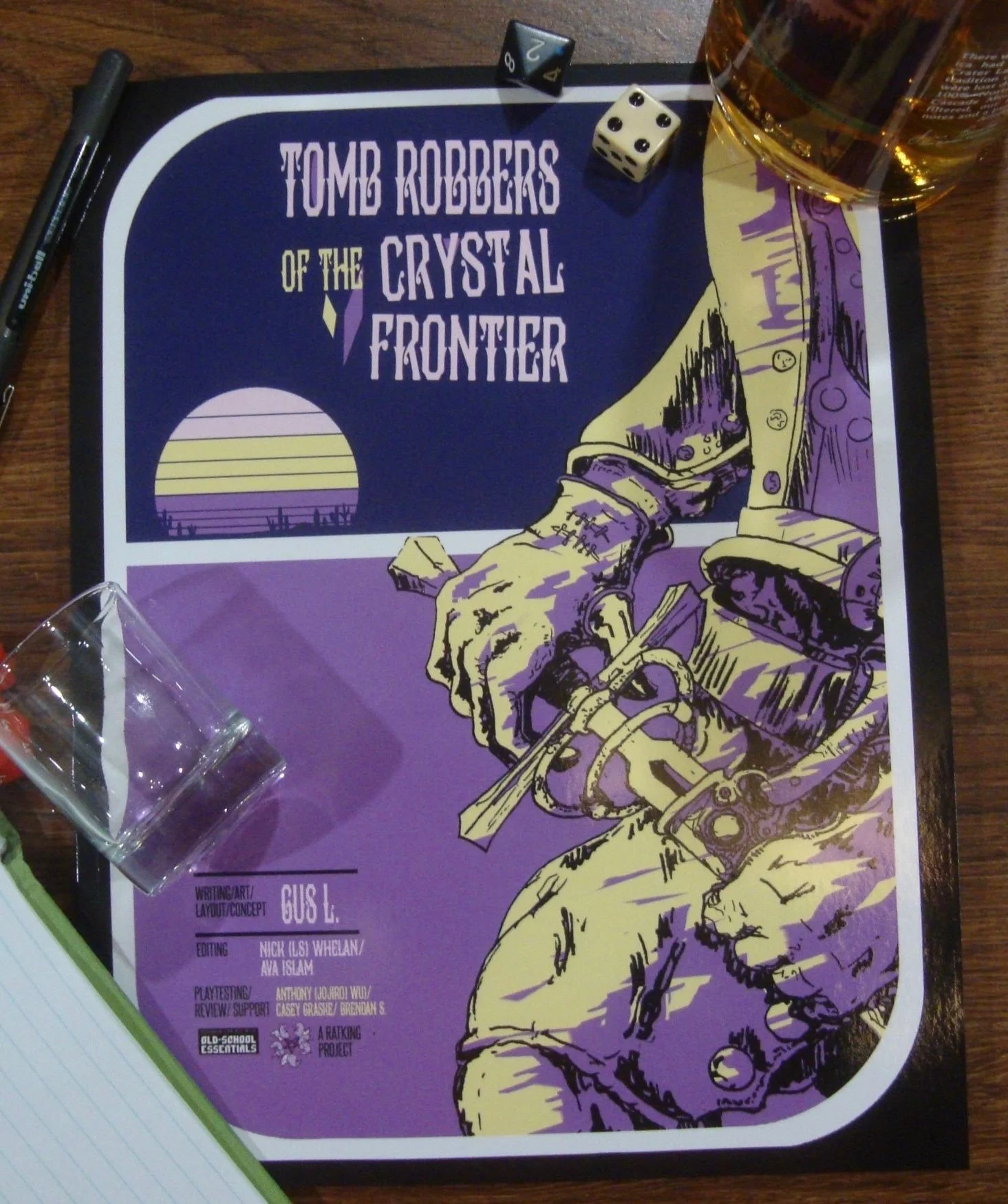Hey, You Got Commercialization In My Hobby (also ZineQuest 4)
If you read nothing else, check out this tracker of all the ZineQuest 4 projects created by my colleague, Ty of the Mindstorm blog (disclosure: I helped a smidge). I’m here to talk more about ZineQuest 4 and highlight some zines that are currently funding, but first, you must allow me to opine briefly on commercialization.
Luxury Games
Earlier this year, my colleague, Marcia of the Traverse Fantasy blog, caused something of a stir with her call to action to “reject the predominant culture of the hobby and to strive for a community with non-commercial interactions between [its] members.” In that piece, she argued, with some invective added for good measure, that buying and selling TTRPGs (1) is the current, predominant mode of conversation within the hobby, (2) TTRPGs are not profitable (with rare exceptions) and tend to be harmful when people try to make a career of it, and (3) commercialization is unnecessary for the actually playing role-playing games. More recently, Tom Van Winkle of the Lich Van Winkle blog sang a similar tune with regards to the increasing commercialization of the hobby but in a different tone. While Marcia rallied the troops and stood athwart commercialization yelling stop, Mr. Van Winkle is more melancholy, resigned to this diminished present, which “is disappointing to a dreamer like” Mr. Van Winkle. In his post, Mr. Van Winkle observed that “putting a price tag on a game makes it socially real and legitimate in the ways described above, not just for others but also for ourselves.”
What do we get out of selling games anyway? My aforementioned colleagues are correct that, aside from those who wish to make a career of it (which both rightfully warn against), the goal of TTRPG creators is for people to play the games they make and for the game to further the overall conversation of TTRPGs. It is a great feeling, as a designer, to be able to squint at a game that came after yours and ask, “did I influence that?” It is a very interesting feeling. For most TTRPG creators, this is easily achieved–you simply bring your creations to your own game table! But sometimes that is just how it starts out. Some devious designers aren’t content with just their friends playing their games. These creeps want as wide of an audience as possible! And not merely to maximize profits, but for its own sake.
Here is a thought experiment: Let’s say (1) you are one of these absolute freaks, (2) you don’t care (or it is, at best, a secondary or tertiary concern) about making money from your hobby, and (3) you want as many eyeballs as possible on your game, you want it played on every dining room table in the world. Would you move more copies of your hypothetical game if you gave it away for free or if you charged some price for it? If you are an animated high school economics textbook, then the answer might surprise you.
Tabletop roleplaying game products are luxury goods. More specifically, they might be Veblen goods. No, wait, don’t exit out of this post, I’ll be quick with the economics stuff. Veblen goods are those products for which the demand actually rises as the price increases, contrary to the ordinary supply-and-demand stuff. This is because the price actually connotes quality, or at least it does in people’s minds. When you think of a $30 TTRPG sold on Kickstarter, do you picture a higher or lower quality product than if you picture a $2 TTRPG on itch.io? (This is not calling anyone out, I have made both a $30 Kickstarter game and a $2 itch.io game.) Typical Veblen goods are expensive champagnes or high-priced lawyers, but it is not farfetched to think that a similar effect may be in play in a niche hobby sphere. Take, for instance, this blog post that claims some board games operate as Veblen goods. So, armed with this knowledge, in the hypothetical case that you were a freak hobbyist with a deviant desire to have people read what you write, you may actually charge $10 or $15 bucks for something that, in your heart, you were willing to give away for free.
For the vast, vast majority of people there is little to no money to be had in TTRPGs. Certainly not enough to replace your regular income. For most producers of games, even those who commercialize their production, they make what they make because of a hobby motive, not a profit motive. With smalltime game makers (of which I am likely a member), there can be confusion about whether they are hobbyists or not. But that is because the commercialization exists as fuel for the hobby aspects. If you are, like me, interested in maximizing the reach of your hobby-writing, you basically have to commercialize it. Charging money for your games makes people think “oh this is an important thing I should pay attention to!” Whereas, giving it away for free strikes people like you’re trying to hand out your mixtape on a busy city street. They don’t want it. As Mr. Van Winkle said, “putting a price tag on a game makes it socially real and legitimate…not just for others but also for ourselves.” To quote a friend, “sometimes the only way to really make an enduring piece of art that has reach is through the market.”
Zines! Zines! Zines!
ZineQuest is a good example of small creators, oftentimes first-time designers, releasing their art into the world. And it is back, this time in August for murky reasons. A byproduct of the uncertainty of this year’s ZineQuest is that a lot of the projects this round might had less prep-time and may lean even harder into the DIY nature that one traditionally associates with zines. And I love that. I love the highly produced stuff too, but with a more DIY zine, it really does feel like there is less of a barrier between you and the designer. It’s nice.
There are currently 76 live projects for ZineQuest 4, with more on the way. If only there were a way to keep track of them all! Well now there is—with the new “Zine Quest 4 Stats 9000” (patent pending), a spreadsheet produced by Ty of the Mindstorm blog. Not only does this collect all the statistics about the various projects in one place, it can tell you stats about all the projects (e.g., over 60% of projects have already funded as of this writing), the top projects (the project currently in first place is doing some really impressive numbers), which projects are ending soon, and so much more. It is information overload in the absolute best way. Everyone say “Thank you, Ty.”
Here are just a few of the projects currently funding that you should take a look at, in an Internet-friendly numbered list:
1. True Horizons + The Mystery of Pigeon Keep
Why you should back it: There is a lot going on with this ambitious project. 3 zines: a system, a setting (a high fantasy forest), and an adventure (a one-shot mystery+dungeoncrawl).
2. Mail Order Apocalypse
Why you should back it: It is a post-apocalyptic game about fighting robots in a capitalist hell-future that uses the the Into the Odd system. That sounds just about tailor made for me!
3. The Lords of Bile Keep
Why you should back it: An overland adventure+dungeoncrawl, but honestly what really caught my eye was the layout. I am a sucker for a nice-looking product and this one looks like it is using its collage style really well.
4. Flying Ostriches & Floating Castles
Why you should back it: First off, I love Joust as a concept and am quite partial to ostriches in general. But more importantly, I backed this same creator’s previous zine this year (“S.M.O.L.”, a bestiary) and really enjoyed it.
5. Toche Thespians
Why you should back it: I have already confessed to being a reformed theater kid. This is a game where you play as kids performing a musical, but I was really won over by the isometric maps. The playbill-style cover didn’t hurt either.
6. Fixers from the Floorboards
Why you should back it: It is fun to play as little underfoot creatures making their way in a much larger world, and as much as I adore Mausritter, sometimes you want to be a Borrower instead of a rodent.
7. Three Pocket-Sized RPGs
Why you should back it: This isn’t quite a zine, but the three games each seem very evocative of their time and place and like something that would be great for a one-shot between sessions of more long-running games.
8. 1400 Lo-Fi Hi-Fantasy
Why you should back it: The 2400 games by Jason Tocci are some of the most evocative games on all of itch.io and this takes those tried and true mechanisms to a familiar fantasy milieu.
9. The Lands of Loor
Why you should back it: Another post-apocalyptic OSR game? Yes, I am nothing if not predictable. But the art in this game is an absolute stand out and I want to see more of it!
10. Knives Out
Why you should back it: I am a bit of an odd bird in the P/OSR for not being a big Mork Borgian, but this zine is not only gorgeous (like all Mork Borg products), it also is a heist adventure featuring a seedy tavern. Too bad it will come out too late for me to pilfer its ideas for my own tavern adventure featuring a seedy heist!
Post-Script Shilling
Assuming you have made it through that gauntlet with you wallet still in tact, I have more news of tantalizing, and more immediate, TTRPG offerings. Tomb Robbers of the Crystal Frontier by Gus L., an instant-classic adventure for your D&D of choice set in a phantasmagoric Western-infused fantasy milieu, is finally available in print! And honestly, it is a steal, so grab it now before Gus comes to his senses.












